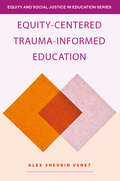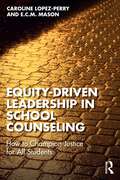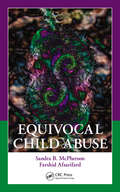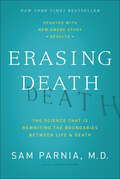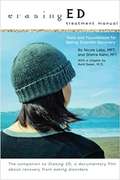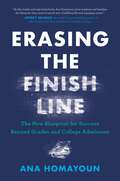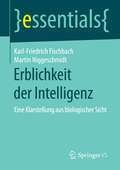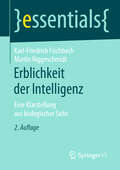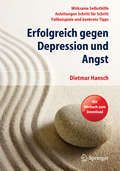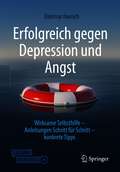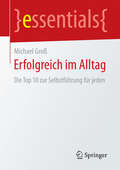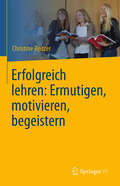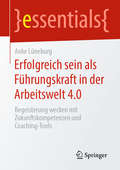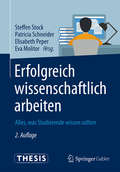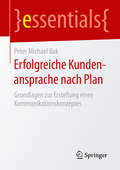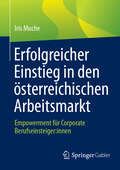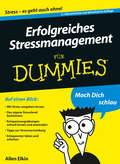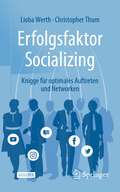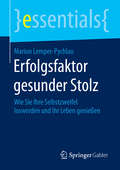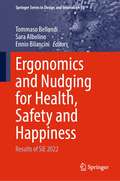- Table View
- List View
Equity-Centered Trauma-Informed Education (Equity and Social Justice in Education Series)
by Alex Shevrin VenetEducators must both respond to the impact of trauma, and prevent trauma at school.Trauma-informed initiatives tend to focus on the challenging behaviors of students and ascribe them to circumstances that students are facing outside of school. This approach ignores the reality that inequity itself causes trauma, and that schools often heighten inequities when implementing trauma-informed practices that are not based in educational equity.In this fresh look at trauma-informed practice, Alex Shevrin Venet urges educators to shift equity to the center as they consider policies and professional development. Using a framework of six principles for equity-centered trauma-informed education, Venet offers practical action steps that teachers and school leaders can take from any starting point, using the resources and influence at their disposal to make shifts in practice, pedagogy, and policy. Overthrowing inequitable systems is a process, not an overnight change. But transformation is possible when educators work together, and teachers can do more than they realize from within their own classrooms.
Equity-Driven Leadership in School Counseling: How to Champion Justice for All Students
by Caroline Lopez-Perry E.C.M. MasonDrawing from the authors’ experience as former school counselors, their research on school counselor leadership and advocacy, and their professional advocacy work, this book provides insights and strategies to develop school counselors’ leadership skills.This book is divided into two parts. The first part focuses on self-reflection and critical consciousness for school counselors. It challenges their understanding of leadership and urges them to critically examine whether their personal definition of leadership aligns with the needs of diverse students and the broader educational context. Chapter topics include leadership and liberation, the limits of traditional leadership theories, leading with emotional intelligence, and the courage to confront systems of oppression. The second part calls the reader toward critical action and engagement in social and political activity and advocacy with the intent to disrupt and change perceived inequalities. Specific topics include developing political skills, addressing resistance to change, and developing collaborative relationships.School counselors will find this book filled with the necessary knowledge and skills to effect change in schools, districts, and the public arena for the benefit of P-12 students, particularly those from historically marginalized populations.
Equivocal Child Abuse
by Sandra B. McPherson Farshid AfsarifardChild abuse cases with hard-to-prove allegations pose challenges for all those who seek to protect the welfare of children. Helping courts, evaluators, guardians, and lawyers understand and work with difficult cases, Equivocal Child Abuse brings together insights, experience, and guidance from multiple sources to minimize unnecessary harm done to c
Erasing Death: The Science That Is Rewriting the Boundaries Between Life & Death
by Josh Young Sam ParniaAn examination of near-death experiences, the science of resuscitation medicine and the bigger questions about what happens to the human mind after death.Contrary to popular belief, death is not a moment in time, such as when the heart stops beating, respiration ceases, or the brain stops functioning. Death, rather, is a process—a process that can be interrupted well after it has begun. Innovative techniques, such as drastically reducing the patient's body temperature, have proven to be effective in revitalizing both the body and mind, but studies show they are only employed in approximately half of the hospitals throughout the United States and Europe.In Erasing Death, Dr. Sam Parnia presents cutting-edge research from the front line of critical care and resuscitation medicine that has enabled modern doctors to routinely reverse death, while also shedding light on the ultimate mystery: what happens to human consciousness during and after death. Parnia reveals how medical discoveries focused on saving lives have also inadvertently raised the possibility that some form of “afterlife” may be uniquely ours, as evidenced by the continuation of the human mind and psyche in the first few hours after death. Questions about the “self” and the “soul” that were once relegated to theology, philosophy, or even science fiction are now being examined afresh according to rigorous scientific research.With physicians such as Parnia at the forefront, we are on the verge of discovering a new universal science of consciousness that reveals the nature of the mind and a future where death is not the final defeat, but is in fact reversible.
Erasing ED Treatment Manual: Tools And Foundations For Eating Disorder Recovery
by Sheira Kahn-Laby Kahn Sheira Kahn Mft Nicole Laby MftThe Erasing ED Treatment Manual, a companion to the award-winning documentary aired nationally on PBS, provides a digest of information on the assessment, diagnosis, medical aspects, causes and treatment of eating disorders. It is written for mental and physical health-care providers, but clear language makes it accessible to non-professionals.
Erasing the Finish Line: The New Blueprint for Success Beyond Grades and College Admission
by Ana HomayounMoving beyond a prescribed path for success, Erasing the Finish Line highlights the essential skills to help each young person thrive in school and life For years, we&’ve been led to believe that great grades, high test scores, and college acceptance are key to a successful life. Yet our laser focus on these achievements leaves students feeling anxious, demoralized, and unprepared. What if we&’ve overlooked the critical skills young adults need to navigate an ever-changing world? What fundamental skills help young people adapt, persevere, and thrive? Academic advisor and early career development expert Ana Homayoun answers these questions and more in her accessible and solutions-oriented guide to transforming future generations. In her ground-breaking new book, Erasing the Finish Line, Homayoun flips the way we think about education. In this refreshing approach, Homayoun reveals new strategies to help each student develop their own blueprint for success, including how to: Develop a system based on executive functioning skills Build valuable social capital while fostering genuine connections Identify energy profile and how to recharge Expand perspective through immersive exposure Remain adaptable in the face of disappointments and setbacks Through a powerful blend of theory, strategies and storytelling from former and current students, Homayoun&’s layered approach to revisioning education will bring sharp realization to parents, educators, and policy-makers alike.
Erblichkeit der Intelligenz: Eine Klarstellung aus biologischer Sicht (essentials)
by Karl-Friedrich Fischbach Martin NiggeschmidtDieses Kompendium greift ein umstrittenes Thema auf: Ist Intelligenz erblich? Bei der Beantwortung dieser Frage geraten selbst Fachleute ins Schwimmen. Schuld daran sind missverständliche Fachbegriffe und überzogene Vorstellungen von der Aussagekraft des in der Intelligenzforschung genutzten Erblichkeitsmodells. Karl-Friedrich Fischbach und Martin Niggeschmidt erläutern das Modell aus Sicht der Biologie - jenes Wissenschaftsbereichs also, in dem es ursprünglich entwickelt wurde. Wer sich die Logik des Modells vergegenwärtigt, stellt fest: Intelligenz als ,,erblich" zu bezeichnen, ist unpräzise und irreführend.
Erblichkeit der Intelligenz: Eine Klarstellung aus biologischer Sicht (essentials)
by Karl-Friedrich Fischbach Martin NiggeschmidtIst Intelligenz erblich? Karl-Friedrich Fischbach und Martin Niggeschmidt zeigen, dass „Erblichkeit“ in der biologischen Fachsprache etwas anderes bedeutet als in der Alltagssprache – was fast zwangsläufig zu Fehlinterpretationen führt. Die 2. Auflage dieses essentials wurde um Kapitel zur Aussagekraft von Zwillingsstudien und genomweiten Assoziationsstudien über IQ-Unterschiede erweitert. Wer sich die Logik der Modelle und Methoden vergegenwärtigt, stellt fest: Intelligenz als „erblich“ zu bezeichnen, ist unpräzise und irreführend. Die Autoren:Prof. Dr. Karl-Friedrich Fischbach ist Entwicklungsbiologe und Neurogenetiker. Er war von 1985 bis 2013 Professor für Biophysik und Molekularbiologie an der Universität Freiburg, davon zwei Jahre lang als geschäftsführender Direktor des Instituts für Biologie III.Martin Niggeschmidt ist Redakteur in Hamburg.Stimmen zur 1. Auflage:„... Das zugänglich geschriebene Werk erklärt faktenbasiert und anhand zahlreicher Abbildungen den komplexen Stoff, um so Missverständnisse, aber auch bewusste Falschaussagen aufzudecken.” (Arne Baudach, in: Spektrum der Wissenschaft)„... wirklich lohnenswert, ja verdienstvoll ...“ (Joachim Müller-Jung, in: Planckton, Frankfurter Allgemeine Blogs)
Erfolgreich Denken und Arbeiten in Netzwerken: Networking als Kulturtechnik
by Klaus-Dieter MüllerDas Zusammenleben der Menschen hat sich verändert und erfordert entsprechende Verhaltensweisen. Wo Gewissheiten verloren gehen, muss gleichwohl etwas existieren, was die Gemeinschaft zusammen hält. Dieses verbindende Element ist das Netz in all seinen personalen (haptischen) und auch digitalen Formen bis hin zum Crowd Funding. Netze sollen einen Nutzen haben für die Karriere, das Einkommen und für den sozialen Status. Nutzen, Zweck und Wert sind darum drei wesentliche Elemente der Netzwerkarbeit. Klaus-Dieter Müller legt dabei besonderen Wert auf die menschlichen Aspekte von Networking. Dahinter steht ein von ihm vertretenes Menschenbild, nämlich das Selbst als Dreh- und Angelpunkt seines Wirkens in der Welt. Die Identität des Individuums wird zu einem Problem der gesellschaftlichen Moderne. Es kommt nun darauf an, den Zusammenhang zwischen Selbst und Netz zu erkennen. Der Autor liefert viele Tipps, Hinweise und Erfahrungsberichte dazu, wie der Zweck und Nutzen eines Netzwerks mit den eigenen Befindlichkeiten und der Stellung in der Welt in Übereinstimmung zu bringen sind. Netzwerkarbeit ist eine Kulturtechnik, ähnlich wie Lesen und Schreiben, sie kann Gegenstand von Unterricht, Training und Beratung sein.
Erfolgreich Führen in Transformationsprozessen: Kompetenzen einer entwicklungsbereiten Führungskraft (essentials)
by Heiko MiedlichTransformationsprozesse stellen uns vor immer neue Herausforderungen. Der Umgang mit Komplexität im Kontext „Führungskraft“ ist für Organisationen essentiell überlebenswichtig. All die notwendigen (Ver‑)Änderungen basieren auf unserer bewussten Entscheidung, Dinge künftig anders zu machen als bisher. Das gelingt nur, wenn wir lernen. Dabei stehen unsere Werte zentral im Mittelpunkt und beeinflussen bewusst und unbewusst unsere Entscheidungen. Es gibt kein Rezept, wie das gelingt. Aus seinen Erfahrungen weiß der Autor jedoch, welche notwendigen Voraussetzungen erfüllt sein müssen, dass überhaupt die Chance besteht, Teams erfolgreich in Transformationsprozessen zu führen.Den kostenlosen Zugang zum Online-Kurs finden Sie direkt im Buch.
Erfolgreich abnehmen und schlank bleiben: Nachhaltige Gewichtsreduktion wissenschaftlich belegt
by Uwe KnopDieses Sachbuch möchte allen eine ehrliche Unterstützung bieten, die ernsthaft abnehmen und ihr neues Wunschgewicht auch langfristig halten möchten. Denn: Es ist unbestritten, dass viele Frauen und Männer abnehmen wollen, und sie machen Diäten. So werden jedes Jahr aufs Neue viele Abnehmwillige mit falschen Versprechungen zur neuen„besten Diät“ hinters Licht geführt. Dieses Sachbuch geht erstmals einen anderen Weg: I DIET MY WAY - ist das neue Konzept für alle, die ihren individuellen Weg des Abnehmens maßgeschneidert bis zu ihrem persönlichen Wohlfühlgewicht gehen möchten – und anschließend dabei bleiben wollen. In diesem Buch finden Sie alles zum Thema "Kilos verlieren", was Sie wissen müssen, um langfristig abzunehmen und Ihr Wunschgewicht auch zu halten. Dabei basieren die Erkenntnisse und Empfehlungen vom Autor Uwe Knop auf den aktuellen Erkenntnissen und dem derzeitigen Konsens der WissenschaftLeicht verdaulich und unterhaltsam erfahren Sie in diesem Buch: Abnehmen ist möglich.Das Diätprinzip ist bei allen Diäten immer gleich.Das reduzierte Gewicht zu halten, ist die „hohe Kunst“. JoJo-Effekt & Co: Risiken, die Ihr Gewicht ins Schwanken bringenPraxistipps, wie Sie starten und dran bleiben Sie möchten erfolgreich abnehmen und dauerhaft schlank bleiben? Dann lesen Sie dieses Buch.
Erfolgreich gegen Depression und Angst
by Dietmar HanschFühlen Sie sich niedergeschlagen und energielos? Sind Sie ständig überlastet und unzufrieden? Leiden Sie unter Ängsten und körperlichen Reaktionen wie Schwindel, Herzrasen oder -schmerzen? Der Ratgeber hilft Ihnen bei der Entscheidung, ob eine Erkrankung vorliegt, Selbsthilfe möglich oder ein Arztbesuch nötig ist. Hilfe zur Selbsthilfe bei Depression und Angst: Ursachen und Eskalationsmechanismen bei Depression, Burnout, Angst- und Panikstörung werden erklärt Schritt für Schritt die Eskalation unterbrechen, Energie gewinnen, die Ausgangsprobleme lösen Ausführliche und umsetzbare Aufgabenstellungen, die Ihnen helfen, Ihre gesamte Lebenssituation zu optimieren Im Rahmen einer ganzheitlichen Lebenskunst das Gesunde fördern und die Stärken stärken Geeignet auch als Begleitmaterial für Psychotherapie (insbesondere kognitive und achtsamkeitsbasierte Verhaltenstherapie) Mit Hörbuch zum DownloadGeschrieben für Klienten mit Angststörung und Depression, ihre Angehörigen - zur Empfehlung durch Psychotherapeuten, Psychiater, Klinische Psychologen, Mitarbeiter in Beratungsstellen.
Erfolgreich gegen Depression und Angst: Wirksame Selbsthilfe - Anleitungen Schritt für Schritt - konkrete Tipps
by Dietmar HanschDieser Ratgeber hilft allen, die sich niedergeschlagen und energielos fühlen, ständig überlastet und unzufrieden sind, unter Ängsten und körperlichen Reaktionen wie Schwindel, Herzrasen oder -schmerzen leiden. Er hilft Ihnen bei der Entscheidung, ob eine Erkrankung vorliegt, Selbsthilfe möglich oder ein Arztbesuch nötig ist. Wenn das Lesen noch schwer fällt, steht Ihnen ein einführendes kostenloses Hörprogramm zum Download zur Verfügung. Aus dem Inhalt: Ursachen und Eskalationsmechanismen bei Depression, Burnout, Angst- und Panikstörung werden erklärt – Schritt für Schritt die Eskalation unterbrechen, Energie gewinnen, die Ausgangsprobleme lösen – Ausführliche und umsetzbare Aufgabenstellungen, die Ihnen helfen, Ihre gesamte Lebenssituation zu optimieren – Im Rahmen einer ganzheitlichen Lebenskunst das Gesunde fördern und die Stärken stärken – Geeignet auch als Begleitmaterial für Psychotherapie (insbesondere kognitive und achtsamkeitsbasierte Verhaltenstherapie). Über den Autor: Dr. med. Dietmar Hansch ist Facharzt für Innere Medizin/Psychotherapie und Autor zahlreicher Bücher.
Erfolgreich im Alltag: Die Top 10 zur Selbstführung für jeden (essentials)
by Michael GroßDieses essential gibt Antworten auf die drängenden Fragen im Berufsalltag, die für die eigene Führung wichtig sind. Es gibt dem Leser wichtige Tipps, um akute Herausforderungen zu bewältigen und neue Chancen zu nutzen. Der Autor richtet sich dabei an diejenigen, die sofort Antworten auf die Fragen des Alltags suchen und bietet ihnen eine Top 10 der Selbstführung. Die zehn Themen stehen in Beziehung, ergänzen sich und sind zugleich jedes für sich wertvoll – je nach der Situation, die sich Ihnen stellt.
Erfolgreich lehren: Ermutigen, motivieren, begeistern
by Christine ReitzerUnmotiviertes Lernverhalten und abgelenkte Studenten stellen für Lehrende wie für Lernende ein zentrales Problem im Unterricht dar. In diesem Buch wird sowohl etabliertes psychologisches Wissen wie auch Erkenntnisse aus persönlichen Umfragen nutzbar gemacht, um diesem Phänomenen unserer Zeit gezielter begegnen zu können. Sie müssen nicht "ein geborener Lehrer" sein um Ihre Lehre ansprechend zu gestalten. Dieses Werk zeigt eine Fülle von Maßnahmen auf, die Sie für die Praxis berücksichtigen und dadurch Ihre Lehrtätigkeit noch erfolgreicher und effektiver gestalten können.Der Schwerpunkt liegt in diesem Werk auf ermutigenden Ideen, ansprechendem Unterrichtsklima, intrinsischen Motivationsmethoden und professioneller Gesprächsführung. Diese Punkte können Sie als Leser einfach umsetzen, ohne große Programme bemühen zu müssen. Hierzu werden effektive Grundkonzepte vorgestellt, die anhand von Fallbeispielen präzisiert werden. Diese werden abgerundet durch konkrete, praxistaugliche Tipps für typische Alltagssituationen. Diese praxisnahen Hilfestellungen eignen sich für den Unterricht bzw. die Lehre in verschiedenen Wissenschaftszweigen und dienen zur Motivation der Teilnehmer. Dabei schöpft die Autorin aus ihrem eigenen internationalen Erfahrungsschatz sowie aus dem Fundus von vielen weltweit erfahrenen Lehrenden, die sich an den Umfragen beteiligt haben.Zielgruppen für dieses Werk sind alle, die lehren oder sich auf ihre Lehrtätigkeit vorbereiten möchten.
Erfolgreich sein als Führungskraft in der Arbeitswelt 4.0: Begeisterung wecken mit Zukunftskompetenzen und Coaching-Tools (essentials)
by Anke LüneburgIn der Arbeitswelt 4.0 werden andere Führungskompetenzen gebraucht als bisher: Organisationen werden verändert, Führungskräfte übernehmen neue Rollen, Mitarbeiter wollen anders geführt werden. Um als Führungskraft zukünftig erfolgreich zu sein, müssen Entscheider ihre Stärken, Potenziale und Werte kennen und nutzen. Erfolgsfaktoren für echte Führungspersönlichkeiten sind klare Kommunikation, Selbststeuerung und Menschenkenntnis. Anke Lüneburg zeigt in diesem essential, wie Selbstreflexions- und Kommunikationsfähigkeiten entwickelt und für eine erfolgreiche Führung eingesetzt werden können. In kurzen prägnanten Abschnitten werden die wichtigsten Zukunftskompetenzen und ihr Nutzen für unterschiedliche Führungspositionen vorgestellt und können anhand von Übungen u.a. aus dem Coaching umgesetzt werden.Die Autorin:Anke Lüneburg ist Betriebswirtin, zertifizierte Coachin, Mediatorin, Beraterin und Trainerin im Bereich Führung, Berufsstrategien und Potenzialentwicklung sowie Autorin. Sie bringt über 20 Jahre Führungserfahrung als Managerin, Unternehmerin und Ausbilderin mit. Anke Lüneburg ist nebenberuflich Lehrbeauftragte mit dem Schwerpunkt Führungskompetenzen.
Erfolgreich selbstständig: Wie gründe und führe ich eine psychologische Praxis?
by Werner GrossDieses Buch ist ein Leitfaden zur Selbstständigkeit in den verschiedenen Berufsfeldern der Psychologie. Von der generellen Eignung selbstständig in einer (freien) psychologischen Praxis tätig zu werden, über Finanzierungsmöglichkeiten, den Gründungsprozess der eigenen Praxis bis hin zu Detailfragen wie Honorargestaltung beantwortet der Autor die wichtigsten Fragen der Existenzgründung als Psychologe oder Psychologin. Bei vielen Studierenden an der Schwelle zum Beruf, aber auch bei angestellten Psychologen besteht ein großer Informationsbedarf, wenn es um Kalkulationen, Konzepte, Kapital und Klienten geht. Und selbst „alte Hasen“ können davon profitieren – und sei es nur, um zu prüfen, ob sie bei ihrer Selbstständigkeit auch an alles gedacht haben. Hilfreich sind dabei Links zu Video-Clips des Autors. Aus dem Inhalt: Was müssen angehende Psychotherapeuten oder Psychotherapeutinnen auf ihrem Weg in die Selbstständigkeit beachten? – Welche Chancen hat man in der Rechtspsychologie? – Welche Optionen bietet die freie Wirtschaft? – Kann man von den Honoraren als Coach, Mediator oder Supervisor leben? – Welche Vorstellungen und Orientierungen sind dringend erforderlich, und wie steht es um das liebe Geld? – Wo sind die Gefahren und Klippen der Selbstständigkeit? Der Autor: Werner Gross, niedergelassener Psychotherapeut, Coach und Unternehmensberater ist Experte des BDP für Existenzgründungsfragen und führt seit über 30 Jahren Seminare für Psychologen und Psychotherapeuten durch.
Erfolgreich selbständig
by Werner Gross Andreas Goshöfer-NeubertDieses erste "Service"-Fachbuch für Psychologen liefert einen Leitfaden für die Existenzgründung in den verschiedenen Berufsfeldern der Psychologie. Der Autor, niedergelassener Psychotherapeut und Experte für Existenzgründung, beantwortet alle wesentlichen Fragen: von der Eignung für das selbständige Arbeiten über Finanzierungsmöglichkeiten, den Gründungsprozess bis zu Detailfragen wie Honorargestaltung. Außerdem werden die verschiedenen Tätigkeitsfelder für Psychologen - diplomiert oder mit Bachelor/ Master-Abschluss - vorgestellt.
Erfolgreich wissenschaftlich arbeiten: Alles, Was Studierende Wissen Sollten
by Steffen Stock Patricia Schneider Elisabeth Peper Eva MolitorDie Autoren vermitteln in diesem Buch Techniken, mit denen sich alle Prüfungsformen im Rahmen des Studiums meistern lassen. Zu den Instrumenten gehören Lese- und Schreibtechniken sowie die gezielte Vorbereitung auf Referate. Hochschuldozenten selbst schildern in dem Band, was sie von den Studenten erwarten. Der interdisziplinäre Ratgeber präsentiert das geballte Wissen vieler Hochschulabsolventen und ist für Studierende aller Disziplinen geeignet.
Erfolgreiche Kundenansprache nach Plan: Grundlagen zur Erstellung eines Kommunikationskonzeptes (essentials)
by Peter Michael BakIndiesem essential erläutert Peter MichaelBak, wie ein Kommunikationskonzept für ein Produkt, eine Marke, eineDienstleistung oder eine Veranstaltung geplant sowie entwickelt wird und dabeidie wesentlichen Erfolgskriterien berücksichtigt werden. WerbepsychologischeGrundlagen und Praxistipps am Ende der einzelnen Kapitel bieten darüber hinausnützliche Hilfestellung für die eigene Arbeit. Damit sind die Ausführungen füralle interessant, die im Studium, in der Ausbildung oder bereits in Agenturenoder in Unternehmen mit der Aufgabe betraut sind, eine erfolgreicheKommunikationsmaßnahme planen und umsetzen zu müssen. Ganz gleich, ob es um(neue) Produkte und Dienstleistungen, Events oder News geht, erst einesorgfältige Planung von geeigneten Maßnahmen macht den Erfolg möglich.
Erfolgreicher Einstieg in den österreichischen Arbeitsmarkt: Empowerment für Corporate Berufseinsteiger:innen
by Iris MucheDieses Buch richtet sich an alle, die gerade in den österreichischen Arbeitsmarkt eintreten möchten, oder dies vor kurzem getan haben, und sich dabei eine Unterstützung wünschen. Durch Einblicke in die Bereiche Bewerbungsprozess, Arbeitsrecht in Österreich, selbstsicheres Auftreten, Arbeitseffizienz, Weiterentwicklung und Netzwerken sollen Leser:innen gut für ihr Arbeitsleben gerüstet werden.
Erfolgreiches Stressmanagement für Dummies (Für Dummies)
by Allen ElkinStress kann immens negative Auswirkungen auf den geistigen, körperlichen und emotionalen Zustand haben und das Leben somit beeinträchtigen. Allen Elkin gibt viele Tipps, wie Sie Stress im Privatleben und im Beruf wirksam managen und vermindern können. Zunächst zeigt er auf, was Stress überhaupt ist, wie er sich auf das persönliche Wohlbefinden auswirkt und wie man sein persönliches Stresslevel bestimmt. Anhand von vielen Übungen lernen Sie, wie Sie mit Stress umgehen und damit wesentlich entspannter werden. Außerdem erklärt Elkin, wie man Stress verringert und stressende Situationen vermeiden kann.
Erfolgsfaktor Socializing: Knigge für optimales Auftreten und Networken
by Lioba Werth Christopher ThumSocializing ist so bedeutsam geworden wie nie zuvor. Menschlich miteinander „zu können“, ist wichtiger denn je, da der Wettbewerb immer stärker und die Nischen immer kleiner werden. Trotz des Wunsches, es möge „leicht und locker“ sein, gilt es, Eindruck zu machen, sich zu präsentieren und Geschäfte abzuschließen. Worauf kommt es nun wirklich an? Was vom alten Knigge, den bisherigen Umgangsformen und Erfolgsfaktoren gilt noch? Wie bespielt man die moderne Berufswelt im Sinne von Socializing und Networking? In diesem informativen und unterhaltsamen Ratgeber von der Psychologie-Professorin Lioba Werth und dem Gastronomiefachmann Christopher Thum wird Ihnen gezeigt, wie Sie berufliches Socializing sowohl klassisch, modern und smart verstehen und bespielen können. Smalltalk, Networking und Etikette werden nicht als Selbstzweck, sondern als eine Art Methode dargestellt, mit der Sie in vielen unausgesprochenen Botschaften signalisieren können, wie Sie auch außerhalb der Büroumgebung mit anderen Menschen umgehen.
Erfolgsfaktor gesunder Stolz: Wie Sie Ihre Selbstzweifel loswerden und Ihr Leben genießen (essentials)
by Marion Lemper-PychlauMarion Lemper-Pychlau zeigt auf, wie sehr Selbstzweifel uns in der Berufswelt und im Privatleben schaden können und warum wir uns ihnen nicht einfach überlassen dürfen. Außerdem erfahren Sie etwas über die Beschaffenheit und Entstehung der Selbstachtung. Schließlich erläutert die Autorin, wie Sie Ihre Selbstzweifel loswerden und durch Selbstvertrauen ersetzen. Denn eines ist sicher: Wir kommen immer nur so weit, wie unser Selbstvertrauen reicht!
Ergonomics and Nudging for Health, Safety and Happiness: Results of SIE 2022 (Springer Series in Design and Innovation #28)
by Sara Albolino Ennio Bilancini Tommaso BellandiThis book presents the best, peer-reviewed contributions from the XII Congress of the Italian Society of Ergonomics and Human Factors (SIE), held in Lucca, Italy, on May 2-4, 2022. By highlighting the latest theories and models, as well as cutting-edge technologies and applications, and by combining findings from a range of disciplines including engineering, design, robotics, management, computer science, human biology and behavioral sciences, it provides researchers and practitioners alike with a comprehensive, timely guide on human factors and ergonomics in a variety of industrial sectors, such as health care, transportation, automotive and constructions. It also offers an excellent source of innovative ideas to stimulate future discussions and developments aimed at applying knowledge and techniques to optimize system performance, while at the same time promoting health, safety, and well-being of individuals anc communities. The proceedings includes papers from researchers and practitioners, scientists and physicians, institutional leaders, managers, and policy makers that contribute to constructing the Human Factors and Ergonomics approach across a variety of methodologies, domains, and productive sectors.
